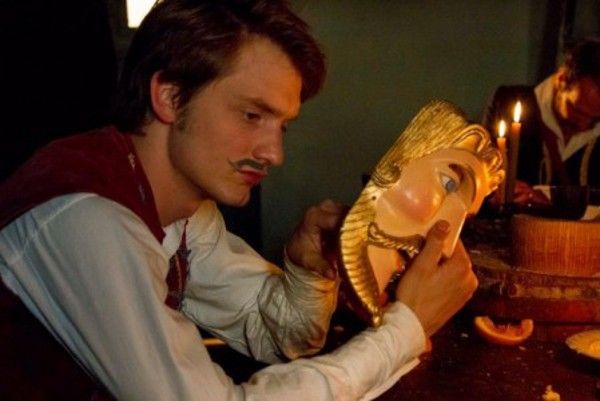Eye For Film >> Movies >> Falling Star (2014) Film Review
Falling Star
Reviewed by: Rebecca Naughten

Lluís Miñarro is better known as a producer but, having made two documentaries (Familystrip (2010) and Blow Horn (2010)), he has now turned his hand to flamboyant fiction in Falling Star (Stella Cadente). Ostensibly about the short reign of King Amadeo I of Spain in the early 1870s, a little-known episode of Spanish history, the film functions as a metaphor for contemporary Spain and its ongoing state of crisis.
Amadeo (Àlex Brendemühl - on sparkling form) son of the King Vittorio Emanuelle II of Italy, was an elected monarch chosen by the Spanish parliament from a range of dynastic candidates after the deposing of Isabel II. Representing a progressive and constitutional monarchy - and he is shown here to have had radical ideas for the time (including the separation of Church and State) - Amadeo's reign was beset by intrigue and instability, and he would abdicate after only a few years in frustration at what he saw as an ungovernable country. Progressive social values being hindered by the conservatism of those holding the reins of power, in a system characterised by corruption and the venality of financial institutions, while the Basques and Catalans clamour for their own states - 1872 or 2014, plus ça change...

If that makes Falling Star sound like a dry dissection of European politics in a period setting, rest assured that Miñarro's sense of humour and theatricality give a surreal filter to things. The castle is effectively a state of limbo for the King, with Àlex Brendemühl conveying varying degrees of listless boredom as Amadeo is left to his own devices and ignored or patronised by his ministers. Miñarro creates a wonderland-like opulent space (the use of trompe l'oeil in the set decoration adds to the sense of illusion challenging reality in the mind of the King), inhabited by a menagerie - white rabbits ("Set these rabbits free!" is my favourite subtitle of the year so far), a bejewelled tortoise, and a peacock all roam the castle - and a handful of servants.
This sense of limbo spreads into the narrative itself, which drags at times and has some peculiar digressions into the sexual peccadillos of Amadeo's two male servants (Lorenzo Balducci and Àlex Batllori) - although fair play to Miñarro for redressing the traditional gender balance in terms of displays of onscreen nudity. In the second half, the arrival of Amadeo's wife, María Victoria (Bárbara Lennie) - who brings with her an anachronistic soundtrack of 1970s French chanson - gives Amadeo someone to spark against and reinvigorates the narrative as a result.
There is plenty to admire here, including some clever juxtaposition of audio and image - such as the sound of Amadeo being sworn in as King playing over the image of his attending the wake of his chief champion, Prim, who was assassinated on the day of Amadeo's arrival (doom seems inevitable after that start). Likewise, the bricolage of cinematic styles and artistic and musical references employed by Miñarro to create this kingly phantasmagoria heightens the idea of limbo, or events being filtered through Amadeo's subconscious. But while there is always something to capture your attention, the point being made - if indeed there is a point being made (the connection to contemporary Spanish politics is underdeveloped apart from some of the ministers' chicanery and Amadeo's abdication speech) - is sometimes lost beneath the (admittedly sumptuous) surface.
It could do with being shorter, and possibly less 'busy', but this is a humorous take on the past shot through with visual flair by a director with an eye for fun and the surreal.
Reviewed on: 24 Jun 2014














